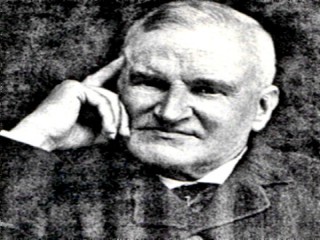
Francis Parkman biography
Date of birth : 1823-09-16
Date of death : 1893-11-08
Birthplace : Boston, Massachusetts, U.S.
Nationality : American
Category : Famous Figures
Last modified : 2011-05-08
Credited as : Historian and author, The Oregon Trail: Sketches of Prairie and Rocky-Mountain Life, France and England in North America
Francis Parkman, American historian, brilliantly narrated the Anglo-French conflict for control of North America in a great multivolume work.
Francis Parkman was born to wealth in Boston, Mass., on Sept. 16, 1823. As an undergraduate at Harvard, he had the advantage of study with the historian Jared Sparks, who gave Parkman his first reading list on the "Old French War." Through letters of introduction to other scholars, Sparks eased the young man's path.
While still a sophomore (he graduated in 1844), Parkman planned a history of the "Old French War" which would end with England's conquest of Canada. An older contemporary historian, George Bancroft, who had gone over some of the ground later traversed by Parkman, provided a framework for his more gifted successor. James Fenimore Cooper's "Leather-Stocking Tales" and Sir Walter Scott's "Waverley Novels" were spurs to Parkman's ambition to write a great history on a North American theme. An accolade from qualified judges would still the doubts of his father and win the applause of Englishmen who derided American cultural achievements.
For Parkman, books, teachers, and archives were not enough. His untiring zeal for perfection demanded onsite inspection of the contested region in America. In the summer of 1845, on a trip westward, he gathered information from old settlers, talked with Indians, and studied the topography of the region near Detroit. The next year Parkman went farther west to see Indians in their native state, unchanged by contact with white civilization. This, he said, was a necessary part of training for his lifework. His experiences in the wilderness gave Parkman color and texture for much of his subsequent writing. The immediate result was his classic, The Oregon Trail (1849).
Parkman's health, never robust, worsened after his trip westward. Partial blindness and severe headaches almost made an invalid of him. To aid his writing he used a frame constructed like a gridiron, and with it he composed The Conspiracy of Pontiac (1851). At first he could manage only six lines a day. With improved health he worked faster. Aid was offered by Catherine S. Bigelow, whom he married in 1850 and who acted as his amanuensis. Parkman was forever battling illness, terming it the "Enemy." He was a sociable man, his friends Boston's intellectual elite, his correspondents widely dispersed scholars. Despite chronic illness he conveyed the impression of a strong, big-boned Yankee.
Parkman hoped to start work on the beginnings of the Anglo-French struggle immediately after Pontiac. But ill health delayed The Pioneers of France in the New World until 1865. He had, however, already written large parts of other volumes in his projected series. The Jesuits in North America (1867) paid tribute to the courage and martyrdom of the Catholic missionaries. In La Salle and the Discovery of the Great West (1869; revised 1879) the French explorer is the heroic figure, caught in tragic circumstances yet facing frightening odds with immense courage.
The theme of The Old Regime in Canada (1874) was France's attempt to tighten its hold on its American colony and its eventual failure. Parkman, like other historians of the romantic school, was less interested in the slow process of establishing a civilization than in its unusual, colorful incidents. In this volume, however, he came close to later social historians with such chapters as "Marriage and Population" and "Trade and Industry, " which were skillfully interwoven with his narrative.
Count Frontenac and New France under Louis XIV (1877) celebrated the greatest man ever to represent his country in the New World. Parkman's masterpiece, Montcalm and Wolfe (1884), was acclaimed the finest in the series. With this judgment the author himself agreed. He was unsure of how to fill the chronological gap between Frontenac and Montcalm and Wolfe, but he managed to do so with A Half Century of Conflict (1892). The absence of a central character around whom to spin his narrative deprived this final volume in the series of the dramatic interest that enlivened its predecessors.
Parkman's rapport with his aristocratic heroes, cast in a medieval mold, stemmed from his own political beliefs. He preferred a conservative republic, with restricted suffrage, where, he said, "intelligence and character and not numbers hold the reins of power." The pageantry of war fascinated him; the military instincts, he thought, were always "strongest in the strongest and richest nature."
In his own time Parkman was criticized for unsympathetic treatment of Indians and for alleged bias against Catholicism. Historians have charged him with neglect of social forces which they felt were as important as dominant leaders in directing the course of history. He also failed to consider the role of sea power in the conflict between England and France. However, unstinted admiration is given to his brilliant artistry in maintaining the pace of his narrative.
Though details of Parkman's great work have been altered by later writers, the main structure still stands. What historian Henry Adams wrote to Parkman when Montcalm and Wolfe was published has remained the verdict of admiring readers: With your previous books, said Adams, it "puts you in the front rank of living English historians." Parkman died in Jamaica Plain, Mass., on Nov. 8, 1893.
Letters of Francis Parkman, edited by Wilbur R. Jacobs (2 vols., 1960), which has a good short biography, is particularly revealing of Parkman's thoughts. Representative Selections, edited by Wilbur L. Schramm (1938), excellent on Parkman's milieu, politics, and theory of historical writing, contains selections from his writings. Biographies are Charles Haight Farnham, Life of Parkman (1900); Henry Dwight Sedgwick, Francis Parkman (1904); and Mason Wade, Francis Parkman: Heroic Historian (1942).
















